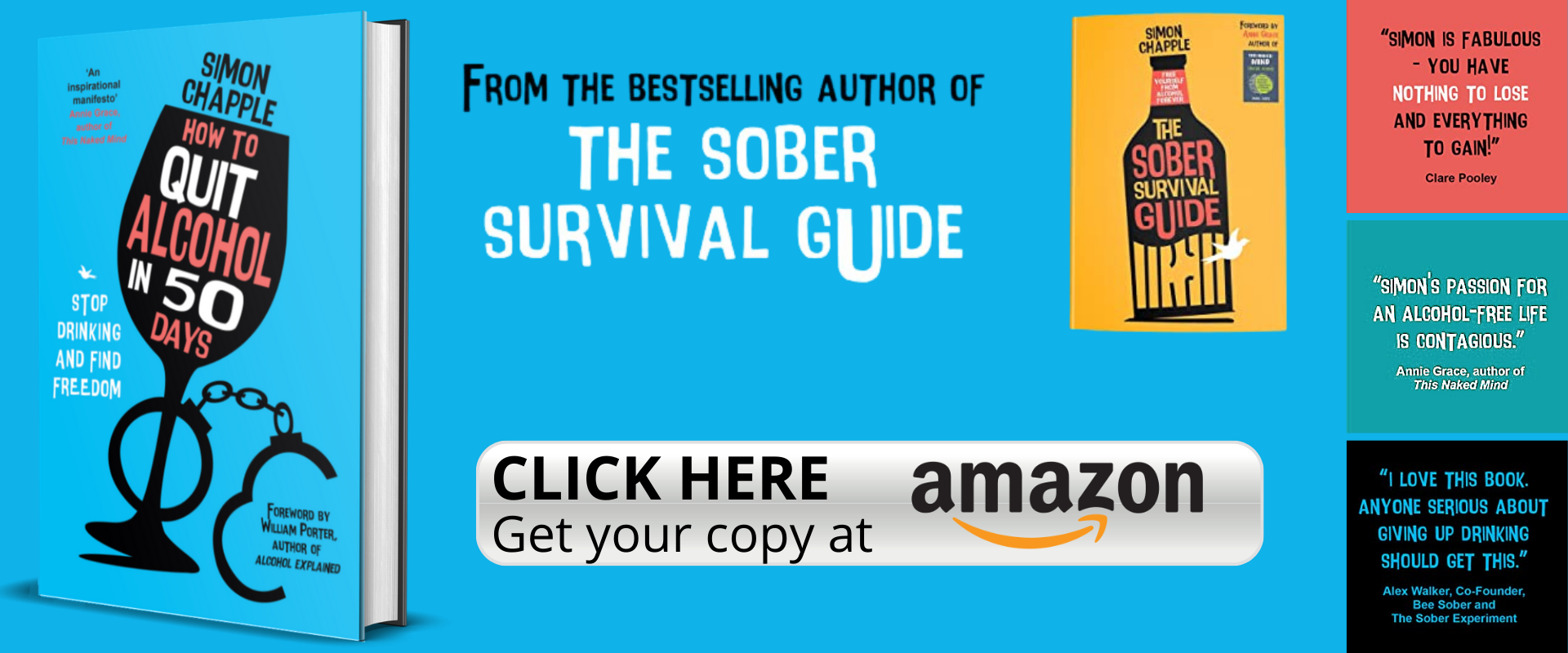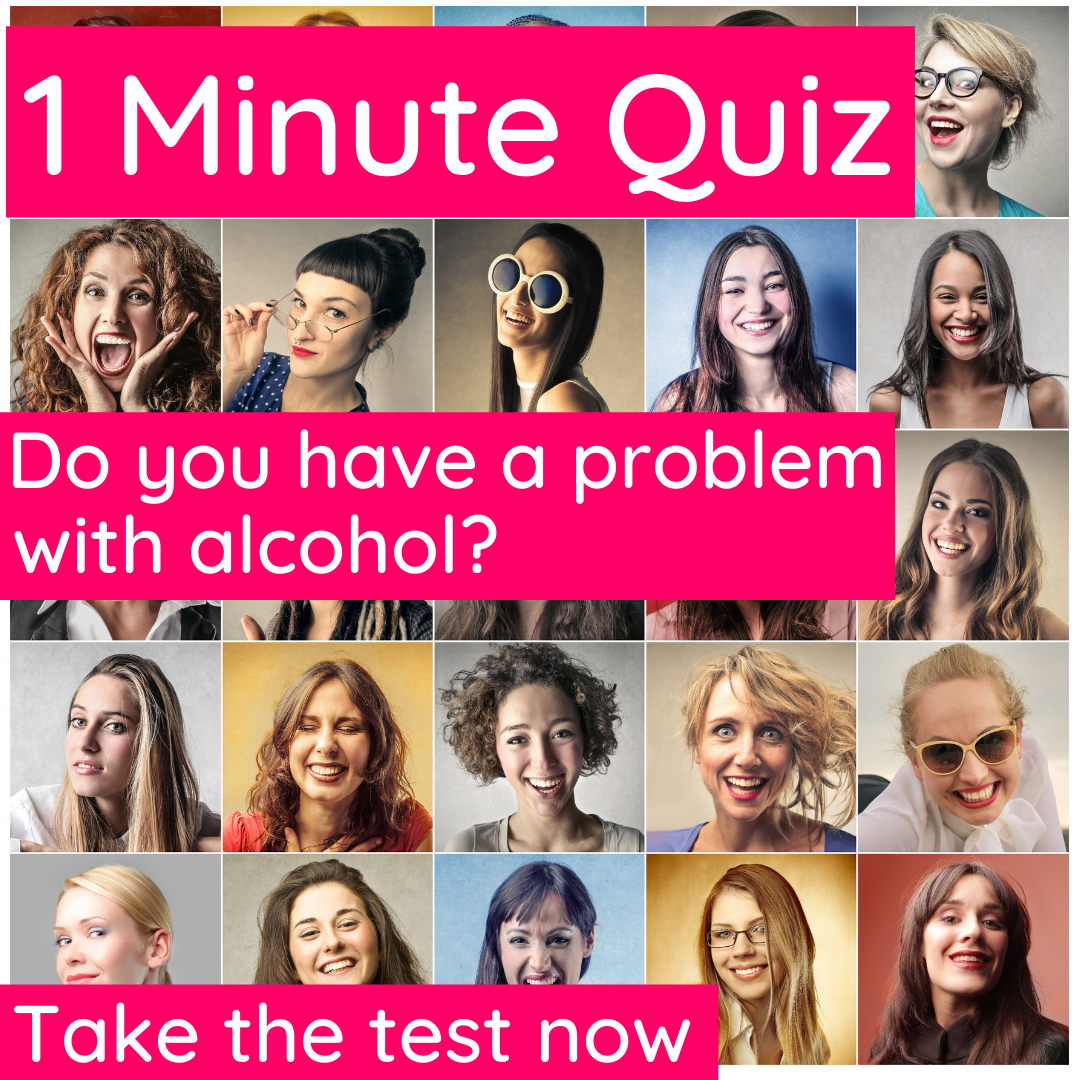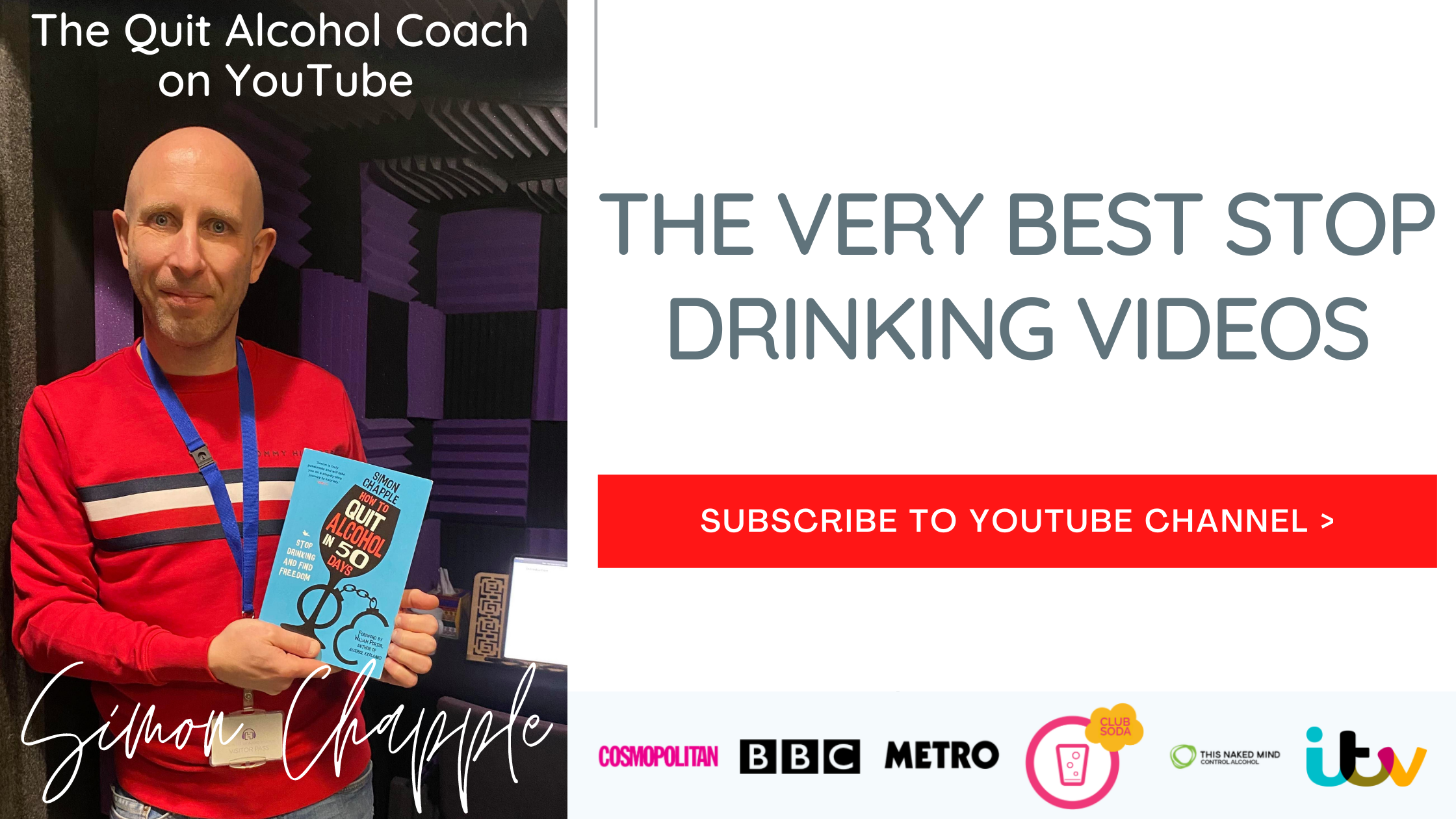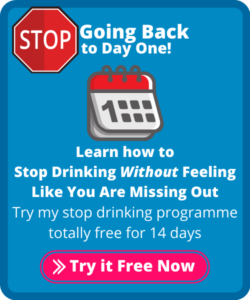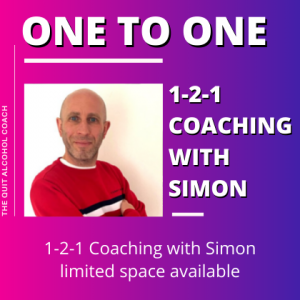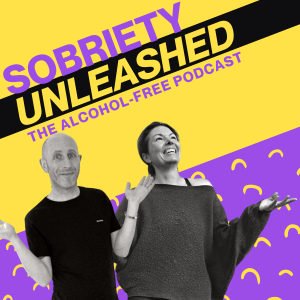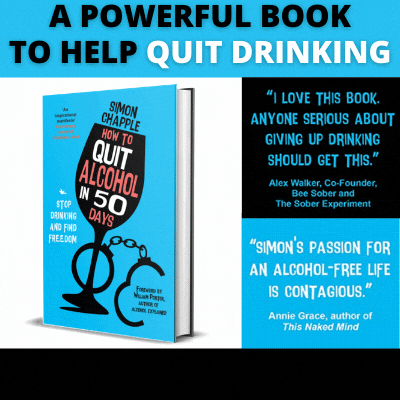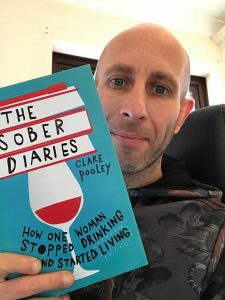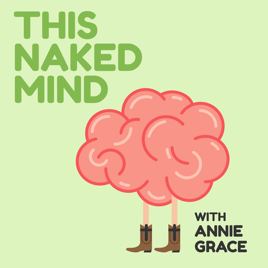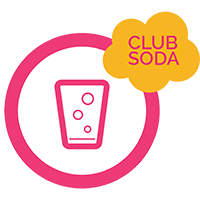How to stop alcohol cravings in their tracks – a tactic that really works
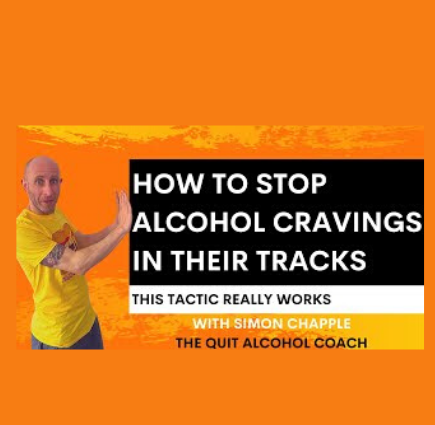
LEAVE A COMMENT AT THE BOTTOM OF THE PAGE – I WOULD LOVE TO HEAR YOUR THOUGHTS
How to stop alcohol cravings – urges and cravings to drink when you want to quit alcohol can feel overwhelming. The tactics in this video will help you stop the cravings to drink in their tracks.
Learn how to claim back control and power of uncomfortable cravings for alcohol and before long the difficult feelings will become less and less frequent, to a point where you find yourself hardly ever thinking about drinking.
I was a heavy daily red wine drinker for over twenty years, I would drink anything from one to three bottles of wine, often with beer on top. There was hardly a single day when I didn’t drink and alcohol ended up having complete power over my life.
Check out the best books for stopping drinking alcohol
I managed to break free and on my YouTube channel you can find all the resources, advice, support and information you need to help you quit drinking forever.
I upload new videos every Tuesday and Thursday at – 6:30pm GMT / 1:30pm EST – so be sure to subscribe to my channel. Click here: https://www.youtube.com/channel/UCkDiUhERjbdHN0kNXbD8UBQ/?sub_confirmation=1
These days I am a qualified quit alcohol coach and I have helped thousands of people change their relationship with drinking, become part of my community and I can do the same for you.
Alcohol cravings can feel awful and it can be easy to tell ourselves that we have no choice but to give in to them and drink. But this is a belief that will hold you back, because it isn’t true and is preventing you from being the best version of yourself.
Watch the video above, learn how to stop alcohol cravings and how to move forward on your journey to freedom from alcohol.
I also recommend reading the article below about the science behind alcohol cravings from The Temper website by Sarah Sheppard.
The Science Behind Alcohol Cravings
The sound of knives clinking against glasses. The smell of bourbon on your friend’s breath. Eating chocolate birthday cake. Alcohol cravings can occur at any time of the day or night; when you most expect them or when you least expect them. Identifying those triggers and overcoming those cravings during recovery can sometimes feel impossible.
“Sometimes if I’m cleaning up after I host an event and I get a strong smell of red wine, it takes me back to that first sip,” says Kelley Kitley, a licensed clinical social worker and international women’s mental health expert who is six years sober.
Understanding what happens to the brain is the first step in understanding how to endure and thrive in the recovery process. Here’s the good news: It is possible to curb the cravings and overcome them. This our guide to what you need to keep in mind as you encounter an alcohol craving (which could manifest as an emotional longing, a thirst, a tremor, anguish, or a desire to feel nothing or everything):
Science plays a role in alcohol addiction
Alcohol is a drug. When a drug of any kind enters the body, it disrupts the body’s natural state. We know alcohol can affect a person’s emotions, decision-making skills, and motor skills, but what happens to the brain when someone drinks again and again?
Alcohol, though classified as a depressant, acts as both a depressant and a stimulant (which is why it brings you both highs and lows). When alcohol is consumed, it directly impacts the body’s neurological pathways, including the glutamate system, which is directly connected to plasticity, learning, and memory. You might be thinking, yes, that explains blackouts, but it’s more complicated than that.
A study published in the Progress in Neuro-Psychopharmacology and Biological Psychiatry describes alcohol dependence as “a reduction in reward threshold, development of a negative affective state, and significant impairments.” Essentially, chronic (constant and excessive) drinking directly alters the brain’s glutamatergic neuroplasticity, which leads to more alcohol cravings and an increase in maladaptive behaviors. Drinking alcohol to avoid anxiety, for instance, is maladaptive behavior.
This is why chronic drinkers are more susceptible to drinking again during the recovery process. When the brain has been significantly altered (and the reward threshold has been significantly reduced), it takes more than the removal of alcohol to overcome the urge to drink again — it takes time, a lot of effort, and often, peer support and professional help.
Triggers need to be recognized
“When the brain receives information that it associates with drinking, like a stressful situation or the smell of a neighborhood bar, it immediately remembers the positive experience with alcohol and sends signals, or cravings, that encourage the behavior,” says Sal Raichbach, the psychology doctor at Ambrosia Treatment Center.
Throughout the recovery process, thoughts, feelings, and physical sensations will come and go — and thankfully, what triggers you today might not trigger you next year. But if you want to overcome the triggers and avoid, minimize, and overcome the cravings, it is necessary to recognize what exactly is triggering you.
“But if you want to overcome the triggers and avoid, minimize, and overcome the cravings, it is necessary to recognize what exactly is triggering you.”
When you used to drink to feel relaxed or to feel more confident, then you might crave alcohol at times when you wish to feel more relaxed (after a stressful meeting) or when you wish to feel more confident (during a first date). Knowing your “alcohol cues” is crucial.
“Sometimes it is not just the environment that can be triggering, but it may be as simple as something you eat. For example, fluctuations in blood sugar levels spurred by certain foods can be mistaken as an alcohol craving to a recovering individual,” says Aaron Sternlicht, Addiction Specialist at Lin & Aaron Coaching, LLC. “We often encourage individuals to keep a craving log in which they can identify the time of day, where they are, who they are with, how they are feeling, and what the intensity of their craving is on a scale of 0 to 100.”
You may be surprised to learn what your triggers are. They will look and feel different for every individual. But we know alcohol addiction is complicated and so is the recovery process. How long you’ve been drinking (how many years, decades), how often (daily, weekly), where you’ve drunk (bars, work, home), what industry you work in (restaurant, healthcare, law) and who you’ve drunk with (friends, parents, kids, coworkers) impacts your drinking behaviors and your needs in recovery.
“Therapeutic methods like cognitive behavioral therapy and dialectical behavioral therapy are helpful to those who are experiencing powerful cravings. These tools help people identify the cognitive processes in the brain that are contributing to their drinking and use coping mechanisms to stop the behavior,” explains Raichbach.
The process to overcome cravings looks different for everyone
“It is possible to train your mind to avoid [alcohol cravings], but it takes work. Just as these associations are formed over time, it takes time to undo connections once they are established,” says Raichbach.
Unfortunately, cravings don’t always go away fully. They can return years, even decades later. One of the best things you can do is recognize them and respond to them in a healthy, positive way.
“I’m not responsible for my first thought,” says Kitley, who still experiences alcohol cravings. “I’m responsible for my preceding thoughts. If I engage in the fantasy of a drink, I can get to an obsessive place and think it wasn’t ‘that bad,’ or I can acknowledge the thought, play the entire tape forward [and acknowledge that] I never had ‘just one.’”
To overcome the craving, she says, “I call my best friend who is also alcohol-free to talk it through and the craving passes. Then, I usually head to my favorite cafe and get a coffee or smoothie.”
“You want to be careful not to replace your alcohol craving with something equally as addictive like nicotine, sex, or gambling.”
How you respond to and engage with a craving is important. You want to be careful not to replace your alcohol craving with something equally as addictive like nicotine, sex, or gambling. Talking through the feelings with a friend, with a mentor, or a mental health professional can be extremely beneficial.
Sternlicht says, “The good news is that, like all human organs, the brain, too, has an incredible power to heal with time. Evidence-based treatments, holistic healing, and other recovery methods have proven to reverse the damage caused by addiction in many cases. Normal life pleasures such as eating a tasty meal, traveling, or spending time with loved ones begin to bring pleasure once again.”
Original article from The Temper here.
Watch the best videos from my YouTube Stop Drinking Channel
———————————————————————————————————–
MORE HELPFUL RESOURCES FOR STOPPING DRINKING ALCOHOL
———————————————————————————————————–


Don’t miss another video – click below to Subscribe and also click on the Bell Icon to be notified about new videos.
Subscribe to my channel here: https://www.youtube.com/channel/UCkDiUhERjbdHN0kNXbD8UBQ/?sub_confirmation=1

https://www.joinbesober.com

https://www.instagram.com/besoberandquit

If you need some inspiration, check this out…

1 – How I quit alcohol after 40 years – https://www.youtube.com/watch?v=H0ydqjrN0AI
2 – Awesome tactic to stop alcohol cravings fast – https://www.youtube.com/watch?v=GedYoBZ_W2M&t
3 – 7 tips for the first week of sobriety – https://www.youtube.com/watch?v=Pq4x0vBEwMw&t
4 – Does alcohol cause depression and anxiety – https://www.youtube.com/watch?v=tkrQpZPHBls&t
5 – Weight loss and stopping drinking alcohol – https://www.youtube.com/watch?v=xyw9jM0kj5U&t



